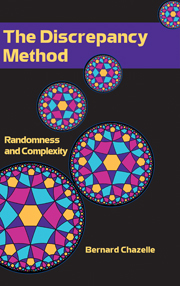Book contents
- Frontmatter
- Contents
- Preface
- 1 Combinatorial Discrepancy
- 2 Upper Bound Techniques
- 3 Lower Bound Techniques
- 4 Sampling
- 5 Geometric Searching
- 6 Complexity Lower Bounds
- 7 Convex Hulls and Voronoi Diagrams
- 8 Linear Programming and Extensions
- 9 Pseudorandomness
- 10 Communication Complexity
- 11 Minimum Spanning Trees
- A Probability Theory
- B Harmonic Analysis
- C Convex Geometry
- Bibliography
- Index
9 - Pseudorandomness
Published online by Cambridge University Press: 05 October 2013
- Frontmatter
- Contents
- Preface
- 1 Combinatorial Discrepancy
- 2 Upper Bound Techniques
- 3 Lower Bound Techniques
- 4 Sampling
- 5 Geometric Searching
- 6 Complexity Lower Bounds
- 7 Convex Hulls and Voronoi Diagrams
- 8 Linear Programming and Extensions
- 9 Pseudorandomness
- 10 Communication Complexity
- 11 Minimum Spanning Trees
- A Probability Theory
- B Harmonic Analysis
- C Convex Geometry
- Bibliography
- Index
Summary
Is we saw in Chapter 4, the difficulty of sampling geometric spaces directly reflects their discrepancy. In the presence of unbounded VC-dimension, we have no combinatorial structure to hang on to, and naive randomization is often the preferred route. The trouble is that the underlying probability spaces are usually of exponential size and straightforward derandomization is intractable. This chapter shows that, by sampling sparse low-discrepancy subsets of the probability spaces, we can often considerably reduce the amount of randomness needed. The connection is intuitively obvious: A low-discrepancy subset should be mostly indistinguishable from the whole set. So, by sampling from it we should be able to fool the casual observer into thinking that we are actually sampling from the whole set. Of course, “casual observer” is our euphemism for “polynomially bounded algorithm.” Thus, if this chapter needed a wordy subtitle, it could be: How designers of probabilistic algorithms can limit the amount of randomness they need through the judicious use of the discrepancy method.
Suppose that we wish to find a random sample S of size s in a universe with n elements. For concreteness, the universe can be thought of as {0, …, n − 1}. The quality of the random sample is measured by its discrepancy relative to any subset. In other words, imagine that we fix a certain F ⊆ {0, …, n − 1}.
Information
- Type
- Chapter
- Information
- The Discrepancy MethodRandomness and Complexity, pp. 316 - 345Publisher: Cambridge University PressPrint publication year: 2000
